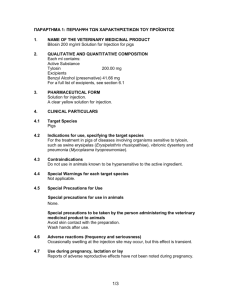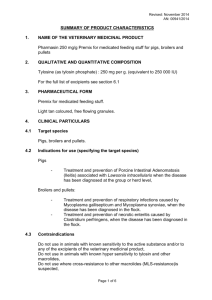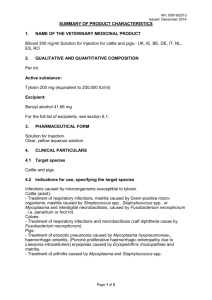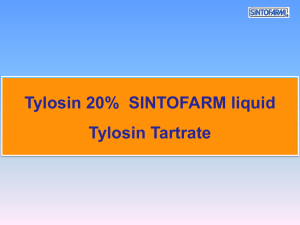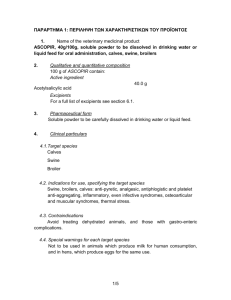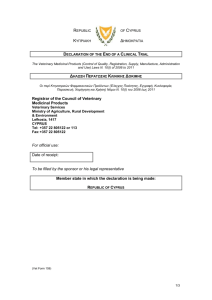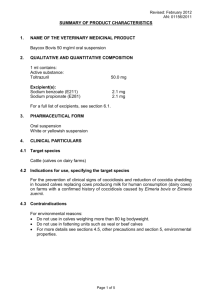summary of product characteristics
advertisement
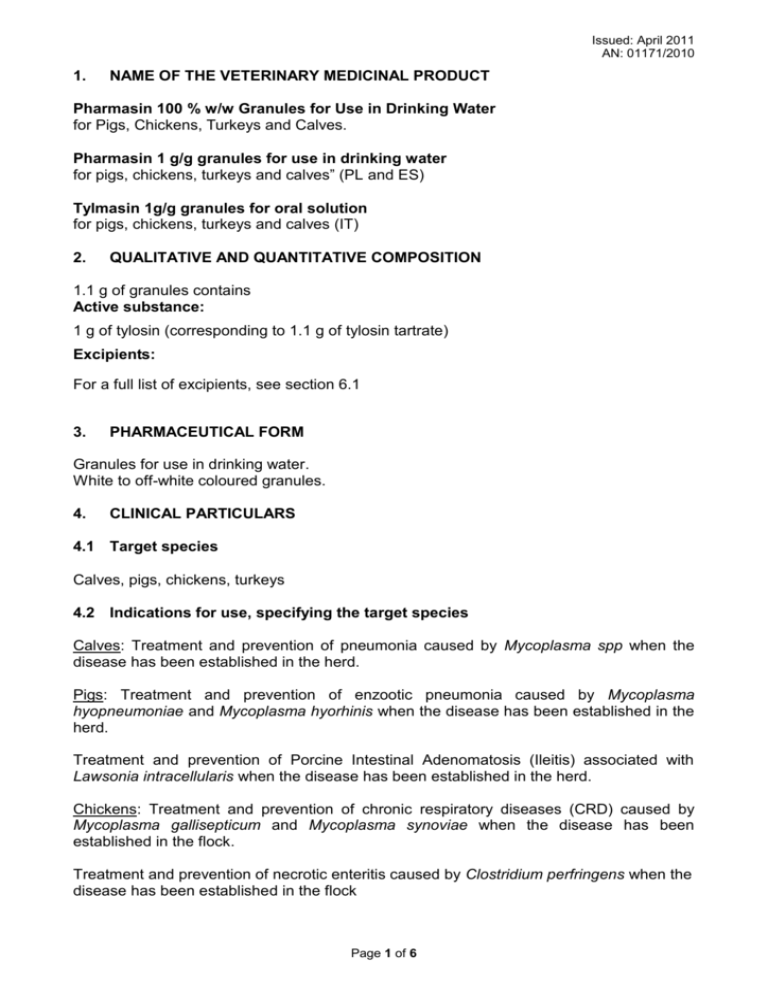
Issued: April 2011 AN: 01171/2010 1. NAME OF THE VETERINARY MEDICINAL PRODUCT Pharmasin 100 % w/w Granules for Use in Drinking Water for Pigs, Chickens, Turkeys and Calves. Pharmasin 1 g/g granules for use in drinking water for pigs, chickens, turkeys and calves” (PL and ES) Tylmasin 1g/g granules for oral solution for pigs, chickens, turkeys and calves (IT) 2. QUALITATIVE AND QUANTITATIVE COMPOSITION 1.1 g of granules contains Active substance: 1 g of tylosin (corresponding to 1.1 g of tylosin tartrate) Excipients: For a full list of excipients, see section 6.1 3. PHARMACEUTICAL FORM Granules for use in drinking water. White to off-white coloured granules. 4. CLINICAL PARTICULARS 4.1 Target species Calves, pigs, chickens, turkeys 4.2 Indications for use, specifying the target species Calves: Treatment and prevention of pneumonia caused by Mycoplasma spp when the disease has been established in the herd. Pigs: Treatment and prevention of enzootic pneumonia caused by Mycoplasma hyopneumoniae and Mycoplasma hyorhinis when the disease has been established in the herd. Treatment and prevention of Porcine Intestinal Adenomatosis (Ileitis) associated with Lawsonia intracellularis when the disease has been established in the herd. Chickens: Treatment and prevention of chronic respiratory diseases (CRD) caused by Mycoplasma gallisepticum and Mycoplasma synoviae when the disease has been established in the flock. Treatment and prevention of necrotic enteritis caused by Clostridium perfringens when the disease has been established in the flock Page 1 of 6 Issued: April 2011 AN: 01171/2010 Turkeys: Treatment and prevention of infectious sinusitis caused by Mycoplasma gallisepticum. when the disease has been established in the flock 4.3 Contraindications Do not use in animals with known hypersensitivity to tylosin or other macrolides. Do not use in cases of known resistance to tylosin or cross-resistance to other macrolides (MLS-resistance). Do not use in animals vaccinated with tylosin-sensitive vaccines either at the same time or within 1 week previously. Do not use in animals with hepatic disorders. Do not use in horses. 4.4 Special warnings <for each target species> Due to likely variability (time, geographical) in susceptibility of bacteria to tylosin, bacteriological sampling and susceptibility testing are recommended. Under-dosing and/or treating for an insufficient length of time are considered to promote the development of resistance in bacteria and should be avoided. 4.5 Special precautions for use Special precautions for use in animals Animals with acute infections may have a reduced water and feed consumption and should be treated with a suitable injectable veterinary medicinal product first. Do not leave or dispose of water containing tylosin tartrate where it may be accessible to either animals not under treatment or wildlife. Special precautions for the person administering the veterinary medicinal product to animals Tylosin may induce irritation. Macrolides, such as tylosin, may also cause hypersensitivity (allergy) following injection, inhalation, ingestion or contact with skin or eye. Hypersensitivity to tylosin may lead to cross reactions to other macrolides and vice versa. Allergic reactions to these substances may occasionally be serious and therefore direct contact should be avoided. To avoid exposure during preparation of the medicated drinking water, wear overalls, safety glasses, impervious gloves and wear either a disposable half mask respirator conforming to European Standard EN149 or a non-disposable respirator to European Standard EN140 with a filter to EN143. Page 2 of 6 Issued: April 2011 AN: 01171/2010 Wash hands after use. In the event of accidental skin contact, wash thoroughly with soap and water. In case of accidental eye contact, flush the eyes with plenty of clean, running water. Do not handle the product if you are allergic to ingredients in the product. If you develop symptoms following exposure, such as skin rash, you should seek medical advice and show the physician this warning. Swelling of the face, lips and eyes or difficulty in breathing are more serious symptoms and require urgent medical attention. 4.6 Adverse reactions (frequency and seriousness) In pigs, adverse reactions have been observed, including diarrhea, pruritus, erythema of the skin, swelling of the vulva, rectal edema and prolapse. These reversible signs appeared 48-72 hours after start of treatment. 4.7 Use during pregnancy, lactation or lay Laboratory studies in mice and rats have not produced any evidence of teratogenic, foetotoxic or maternotoxic effects. No studies have been conducted in the target species. Use only according to the benefit/risk assessment by the responsible veterinarian. 4.8 Interaction with other medicinal products and other forms of interaction Antagonism with substances of the lincosamide group. 4.9 Amounts to be administered and administration route Oral administration through the drinking water In calves the product can also be administered through milk or milk replacer. 1,1 gram of the veterinary medicinal product corresponds to 1 gram of tylosin. The dosages are as follows: Calves: 10 – 20 mg tylosin per kg BW (corresponding to 11 – 22 mg of the veterinary medicinal product per kg BW), twice daily (corresponding to a daily dose of 20 – 40 mg tylosin per kg BW), for 7 - 14 days. Turkeys: 75 – 100 mg tylosin per kg BW per day (corresponding to 82.5 – 110 mg of the veterinary medicinal product per kg BW) for 3 – 5 days. Chickens: For the treatment of chronic respiratory disease: 75 – 100 mg tylosin per kg BW per day (corresponding to 82.5 – 110 mg of the veterinary medicinal product per kg BW) for 3 – 5 days. For the treatment of necrotic enteritis: 20 mg tylosin per kg BW per day (corresponding to 22 mg of the veterinary medicinal product) for 3 days. Page 3 of 6 Issued: April 2011 AN: 01171/2010 Pigs: For the treatment of enzootic pneumonia: 20 mg tylosin per kg BW per day (corresponding to 22 mg of the veterinary medicinal product per kg BW) for 10 days. For the treatment of ileitis or PIA: 5 – 10 mg tylosin per kg BW per day (corresponding to 5.5 - 11 mg of the veterinary medicinal product per kg BW) for 7 days. For the preparation of the medicated water/milk/milk-replacer the body weight of the animals to be treated and their actual daily water/milk/milk-replacer consumption should be taken into due account. Consumption may vary depending on factors like age, state of health, breed, husbandry system. To provide the required amount of active substance in mg per litre drinking water/milk/milk-replacer the following calculation should be made: …… mg tylosin per Average bodyweight (kg) kg bodyweight per day x of the animals to be treated Average amount of drinking water or milk / animal (l) = …...mg tylosin / l of drinking water Sufficient access to the system of water supply should be available for the animals to be treated to ensure adequate water consumption. No other source of drinking water should be available during the medication period. Should there be no clear response to treatment within 3 days the treatment approach should be reconsidered. After the end of the medication period the water supply system should be cleaned appropriately to avoid intake of sub-therapeutic amounts of the active substance which might support development of resistance. Medicated water, milk or milk replacer should be replaced every 24 hours. If individual animals show signs of a serious infection such as a reduced water or feed intake, then they should be treated individually, such as by injection. 4.10 Overdose (symptoms, emergency procedures, antidotes), if necessary There is no evidence of tylosin toxicity in rats, at dose rates of up to 1000 mg/kg by the oral route. There is no evidence of tylosin toxicity in chickens, turkeys, pigs or calves when administered orally at up to three times the recommended dose. 4.11 Withdrawal period(s) Calves (meat and offal): 12 days Pigs (meat and offal): 1 day Turkeys (meat and offal): 2 days Turkey (eggs): Zero days Chickens (meat and offal): 1 day Chicken (eggs): Zero days 5. PHARMACOLOGICAL PROPERTIES Pharmacotherapeutic group: macrolide antibiotic, ATC Vet Code: QJ01FA90 Page 4 of 6 Issued: April 2011 AN: 01171/2010 Pharmacodynamic properties Tylosin is a macrolide antibiotic produced by a strain of Streptomyces fradiae. It exerts its antimicrobial effect by inhibiting protein synthesis of susceptible micro-organisms. The tylosin spectrum of activity includes amongst others Gram-positive bacteria, some Gram – negative strains such as Pasteurella, and Mycoplasma spp. Pharmacokinetic particulars In most species peak plasma concentrations have been attained 1 to 2 hours after administration of tylosin. Compared to plasma levels clearly higher tissue concentrations have been observed. Tylosin was extensively metabolised. Most of the residues are excreted in faeces predominantly consisting of tylosin (factor A), relomycin (factor D) and dihydrodesmycosin. 6. PHARMACEUTICAL PARTICULARS 6.1 List of excipients None 6.2 Incompatibilities In the absence of compatibility studies , this veterinary medicinal product must not be mixed with other veterinary medicinal products. 6.3 Shelf life Shelf-life of the veterinary medicinal product as packaged for sale: 3 years Shelf-life after dilution or reconstitution according to directions: medicated water:24 hours medicated milk or milk replacer:24 hours Shelf-life after first opening the immediate packaging: 3 months 6.4. Special precautions for storage Store in the original container in order to protect from light. Store below 30°C. 6.5 Nature and composition of immediate packaging 1.1 kg resealable block bottom zipped sachet made of polyethylene /aluminium/polyethylene terephthalate laminate 110 g high density polyethylene pot with polypropylene cap Page 5 of 6 Issued: April 2011 AN: 01171/2010 6.6 Special precautions for the disposal of unused veterinary medicinal product or waste materials derived from the use of such products Any unused veterinary medicinal product or waste materials derived from such veterinary medicinal products should be disposed of in accordance with local requirements. 7. MARKETING AUTHORISATION HOLDER Huvepharma NV Uitbreidingstraat 80 2600 Antwerpen Belgium 8. MARKETING AUTHORISATION NUMBER Vm 30282/4017 9. DATE OF FIRST AUTHORISATION 6 April 2011 10 DATE OF REVISION OF THE TEXT April 2011 Page 6 of 6
